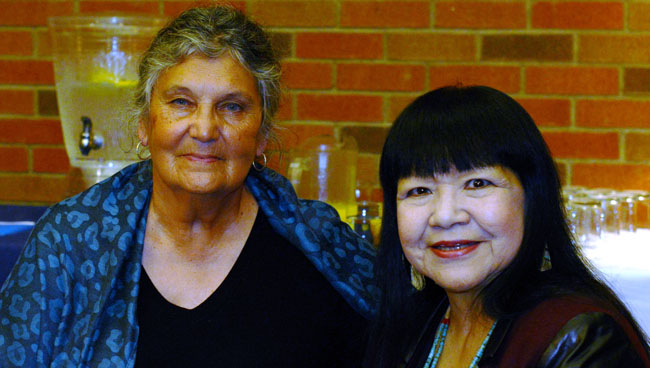Inauguration of the Dbaajmawak Indigenous Writers Series

By Heather Campbell
SUDBURY – It was standing room only at the inaugural event for the Dbaajmawak (They are telling stories) Indigenous Writers Series at Laurentian University. Award winning Métis writer and activist, Maria Campbell, was their first guest author who captivated the audience as she read several stories from her 1995 book, Stories of the Road Allowance People. Stories told to her from her Cree-Michif relations as a child.
Gregory Scofield, poet and assistant professor of English, Laurentian University, has spearheaded this new initiative in order to bring notable Indigenous writers to the university and community. “We are offering an evening with the community but also for the authors to visit with students in class,” says Scofield. His wish list includes authors such as Joseph Boyden, Richard Van Camp and Eden Robinson, just to name a few.
Scofield is an accomplished Indigenous poet himself having won the Dorothy Livesay Poetry Prize for his debut collection, The Gathering: Stones for the Medicine Wheel in 1994. He has an additional five books of poetry and a memoir.
In his search for the first author in the series he drew on those most familiar. Campbell is firstly his mother and a significant influence for him, but she is also part of the Indigenous literature canon. Her bestselling memoir Halfbreed, published in 1973, continues to be read in college and university English programs around the world. Campbell is also an award winning playwright, children’s author, filmmaker and activist. She has influenced many young Indigenous writers across the country. However, she will tell you that she is not a writer but an activist. In fact, Campbell was in the area to attend the Painted Hand ceremony and feast held in Serpent River First Nation on September 12th, a gathering to honour the history between Anishnaageg, Metis, Cree and their allies.
“Mixed blood is controversial but it shouldn’t be,” says Campbell. “We need to celebrate the places that we come from. We must respect how we are different because we are all relatives and this is our mother land.”
Will Morin, Anishinabe mixed blood artist and professor of Indigenous studies at University of Sudbury, was eager to meet Campbell. He admits that living in northern Ontario as an Anishinabe with mixed blood is challenging. “My mother and aunts married non-native men because it was safer for their children at the time,” said Morin. “We each have four grandparents, let’s celebrate all of them.”


